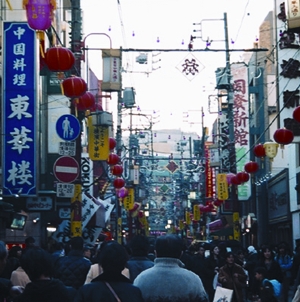Fostering Bonds Of Unity
By Sr Ditma Luz Trocio MIC
A missionary from Baroy, Lanao del Norte, Sr Ditma Luz Trocio is well aware of the plight of migrant workers, particularly that of 
It is a well-known fact. Since about 1990, Taiwan has become one of the favored destinations of a large number of job seekers and capital investors from all over the world. This country’s economic miracle and financial prowess have thus attracted multicultural groups, who as a whole, form a complex society. Workers from Thailand, presently the most numerous, the Philippines, Malaysia, Indonesia, Singapore, India, from African countries and some from the West, have flocked to Taiwan as Overseas Contract Workers (OCWs). Forced by circumstances to work as domestics, migrant workers are hired for specific jobs and are expected to leave Taiwan at the end of a two-year contract. This policy seeks to avoid keeping undesirable migrants in the country as much as it is meant to prevent abusive practices by employers. Issues of injustice, of human rights violations, sex exploitation and other social problems have sprung up. On the other hand some ‘quiet’ churches have become alive because of the presence of Catholic migrant workers who flock to them every Sunday. Some domestic workers who are professionals and deeply committed to their faith have, by their Christian witnessing and sharing of the basic tenets of the faith, influenced the families they work for.
Promoting solidarity

The plight of workers, both foreign and local, is a major concern that the Church in Taiwan today tries to address. These people, especially the OCWs, are the modern poor of Yahweh, marginalized and oppressed members of materialistic society. Individuals who are moved and touched by the situation of these people have volunteered to serve them as chaplains or pastoral carers. The volunteers are mostly religious priests and Sisters from different congregations. Among them are some hired social workers and lay missionaries. For instance, the Church in Taiwan has invited a missionary from Indonesia, Thailand, a Buddhist monk and two Filipino social workers, to help migrant workers who usually do not speak Mandarin nor the local dialect.
In Taiwan, the Church is attentive to this multicultural and multi-faith society without neglecting her mission among the local people. Inserted in the pastoral projects of this Christian community, the MIC Sisters, while helping migrant workers to integrate into local society and its environment, also help the people of Taiwan to receive foreigners into their land with hospitality and gratitude for the contribution they bring. Obliged to come to Taiwan to earn their livelihood, migrant workers bring a valuable contribution to the high degree of economic progress in the country.
Encounter and service
My participation in our mission in Taiwan is both simple and complicated, but challenging and rewarding. As associate chaplain of the Young Christian Workers (YCW) at the Holy Family Church Unit in Taipei, I am privileged to share the pain and struggle of the local laborers and, during our regular meetings on Sunday evenings, when we share our commitment on our faith journey, get to know about the many problems they face. Sometimes, when we have socials, I invite non-Chinese-speaking Filipinos to join us and meet the YCW Chinese group. This encounter favors mutual understanding and the integration of the immigrants into Taiwanese society. As for the members of the Legion of Mary at St Christopher's Church, I help them realize how important it is to understand their rights and claim it and assume their responsibilities with Christian dignity.
I am also involved in the ministry for migrant workers at St Christopher’s Church. I help out in various ways: English and Mandarin classes, pastoral counseling to individuals and families, consultation services for a migrant’s quarterly review and contextualized Bible classes in view of fostering the newcomers’ adaptation and integration into their milieu. As part of journeying with the Legionaries of Mary in their faith and Christian commitment, I occasionally accompany them in their visits to the sick, orphans and prisoners of different nationalities.
Welcoming the stranger
The presence of the Catholic migrant workers enlivens parish life. Churches which have been closed for several years are becoming meeting places. At all the Sunday Masses, St Christopher’s Church is filled to overflowing with Filipino Catholics who actively participate in the liturgy with so much life and vibrant singing. The Church is like a beehive at weekends. There are always meetings of several Church organizations and activities. Often, some of the fervent Catholics stay after Mass with their friends. Sports-fests and cultural activities, theater, folk music, concerts and processions, such as a Santacruzan in May and an Ati-Atihan in January, are organized. Last year, the concert, which in previous years was free, was used to raise funds to meet parish needs. But the audience didn’t mind the small charge because of the great joy they reaped from listening to beautiful and familiar music. This was an opportune time to share the joy of Christmas and also to discover and recognize the varied talents of migrant workers.
Cultural integration is a continuous process that involves newcomers and the local people. Before the overseas contract workers depart from the Philippines for Taiwan, they are given a two-week orientation seminar, a brief introduction to Mandarin and a list of chaplains or pastoral carers whom they may contact according to their needs, particularly while they are undergoing the initial stages in their process of integration. The service of mediation and moral support are important to facilitate the migrant workers’ adaptation to their new community of belonging. For a missionary like myself, being this in-between person – a link between the Taiwanese people and the overseas contract workers – is at the same time an experience of giving and of receiving, a challenge where I experience the Spirit of Jesus in the words, the projects and the deep hopes that unite us.
